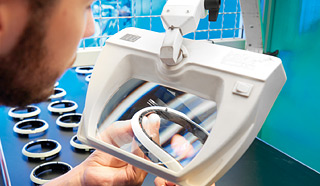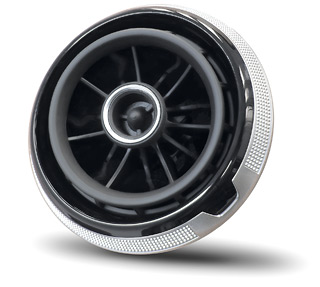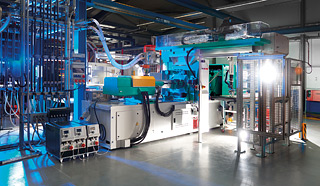
CAQ-Software at FISCHER: Putting a Shine on Quality
Automotive suppliers throughout all of Europe lay their trust in Fischer and more than a third of all cars produced in Europe contain plastic parts produced by Fischer. Whether the complete dashboard of the Audi A6, ventilation nozzles in the Audi A3, speedometer housings in the Mercedes C-Class, or seating applications in Rolls Royce limousines: the more than 600 employees at the three Fischer production facilities ensure that the automotive industry and other specialist lines of industry are supplied with consistently high quality plastic injection moulded parts.
One Stop Shop

Ever since it was founded in the Hessian town of Taunusstein back in 1972, the family owned and operated company Fischer has stood for innovative production methods in the area of plastic surface treatment. Today, 40 years later, the facility at Katzenelnbogen produces around 100,000 parts a day. Apart from producing plastic injection moulded parts, Fischer has also developed into an expert in the area of metallic plastic finishes and the electroplating of ABS plastics. The galvanization methods create a high-grade look that is furthermore characterised by metallic haptics (metallic tactile sensation). In its four galvanization facilities Fischer produces over 350,000 electroplated plastic moulded parts a day.
Quality from A to Z
Fischer covers all steps from the development and construction of the injection moulds to the production and the galvanization of the parts all the way to their assembly. This enables Fischer to support its customers right from the initial product development phase and ensure that the customer gets a product that is tailor-made to meet his individual requirements. The in-house Fischer Akademie allows customers to learn all about the ins and outs of galvanization and injection moulding and thereby better understand the possibilities available throughout the production process.
Checked and Certified
Fischer is certified in accordance with ISO/TS 16949 and ISO 14001 and the company operates its own laboratory. DIN EN ISO 50001 (energy management) was achieved in 2014. The variety of management systems that are implemented by Fischer prove that this is a company that knows a thing or two about the worlds of quality and standards. Due to the relevance of the automotive sector and ISO/TS 16949, the company realized early on that it could not master the requirements of these areas with MS Excel or pen and paper alone. That is why Fischer embarked on an exhaustive search for a suitable software solution that would assist them in consolidating their systems and optimizing their processes even further. Their market research led them to CAQ AG Factory Systems, as their portfolio provided everything that is required for sophisticated quality management in the automotive and plastics industries. It also allowed the step-by-step expansion of the Quality Management Software by adding further modules at a later point in time.

Software Increases Efficiency
The system went live in August 2007 following a 3-month project phase. Head of quality Christian Klaiss and the IT-team initially expected a tough task ahead and were pleasantly surprised when the software implementation and connection to the ABAS ERP-system was completed by CAQ AG’s senior specialist Mr Funk in a mere two hours.
From Core Tools to a Management System
Fischer began with the quality assurance modules Compact.Net for inspection planning, quality inspection, SPC, and LIMS as well as EMP.Net for initial sample inspections, QAM.Net for audit management, and REM.Net for complaint management. These modules were initially implemented at the company’s galvanization sites. After these elements of the software had been fully implemented, Risk.Net for risk management and PMM.Net for gauge management joined the ranks. Over the years the quality management at Fischer was furthermore continuously enhanced with software modules for document management (QBD.Net), process management (Process.Net), change control (Change.Net), supplier management (SRM.Net), and training management (Qualify.Net).
Data Transparency and Central Quality Control
One of the main factors for being able to successfully uphold the regulations of the ISO/TS 16949 is data transparency. With CAQ.Net, Fischer can achieve said transparency by having instant access to all data relating to the quality assurance procedures along the entire production chain. This means that, for instance, data from complaints can be used directly during inspection planning, locked gauges cannot be used for inspections, and the FMEA is connected directly to the production control plan. The entire quality management system is monitored via the QDrive.Net module. It allows the user to select individual persons, customers, suppliers, articles, machines, or processes and receive precise, real-time feedback regarding the data of the selected entity from throughout the entire system.
Fully Integrated

At Fischer the idea of data transparency does not stop at the CAQ-system, as the CAQ-system is also connected directly to the ABAS ERP-system. A standard interface transfers master data between the two systems. This means that all article master data is synchronized and that incoming goods inspections are automatically logged on in the CAQ-system as soon as new incoming goods are registered by the ERP-system. The direct communication between the two systems thereby greatly increases the overall process efficiency in the company.
LIMS and ARBURG ALS
The Connect.Net interface module at Fischer, however, provides even more assistance with regard to data transparency. The combination of Compact.Net and the ARBURG ALS-system, for instance, facilitates additional, decisive benefits. Because the systems are connected via a matched interface, data transmission is fast and complete. The complete evaluation process runs via the Compact.Net module in the form of the usual statistical checks and proof of process capability, for example via histograms, control cards, etc. The module can be used for test planning, test data recording, evaluation and analysis and operates in parallel to the running process. The long-term evaluations and process analyses are always based on the current QS specifications. An overview of the quality of the currently running production also remains available in ALS.
CAQ.Net additionally provides LIMS-functions (Laboratory Information Management System) that are specifically tailored to meet the requirements of galvanization companies. These functions allow Fischer to e.g. control parameters such as acid/metal content of the galvanization baths or inspect layer thicknesses and check raw materials.
Future-Proof
The thorough usage of CAQ.Net in a variety of areas has allowed Fisher to create a quality and environmental management system that provides invaluable support throughout the development and production of a variety of components for the automotive industry. The modular structure of the software and high level of innovation mean that CAQ AG can not only assist Fischer today but also help Fischer tackle the challenges that the future may bring.
Additional Links